Creation Care
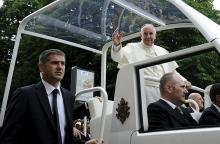
The Vatican on Aug. 10 announced a World Day of Prayer for the Care of Creation, the latest move by Pope Francis to push environmental issues up the global agenda.
The World Day will be celebrated annually on Sept. 1, in line with the Orthodox Church’s day for the protection of the environment, the pope said in the newly-released letter.
“As Christians we wish to offer our contribution towards overcoming the ecological crisis which humanity is living through,” Francis wrote in the letter, addressed to Cardinal Peter Turkson, president of the Pontifical Council for Justice and Peace, and Cardinal Kurt Koch, president of the Pontifical Council for the Promotion of Christian Unity.

THE POPE'S “climate change encyclical,” Laudato Si’ (“Praise Be to You”), is actually far more than that: It is the most remarkable religious document in a generation, offering a powerful and comprehensive worldview that is consonant with the Bible and hence profoundly countercultural. You owe it to yourself to take a few hours and read it slowly and carefully; you’ll be enlightened, but mostly, if you’re like me, you’ll be reassured. Reassured that someone powerful in this world actually sees our time for what it is, and understands the crises facing our planet for what they are.
Near the beginning, for instance, the pope discusses the “rapidification” of life, the sense that “the speed with which human activity has developed contrasts with the naturally slow pace of biological evolution. Moreover, the goals of this rapid and constant change are not necessarily geared to the common good or to integral and sustainable human development. Change is something desirable, yet it becomes a source of anxiety when it causes harm to the world and to the quality of life of much of humanity.”
That’s as useful a description of the last 100 years as we’re likely to get, that sense of life out of balance. It affects the poor, yes, and the pope is always most mindful of the poor—but it also affects everyone. The ever-more-technologized world we inhabit no longer makes us happier. It makes us stressed.
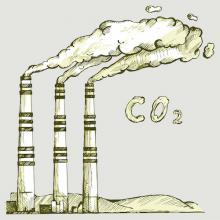
This morning President Obama and the Environmental Protection Agency released the final version of the long awaited “Clean Power Plan,” a regulation setting legally mandated state-by-state reduction targets for U.S. power plants.
Power plants are the nation’s largest source of climate pollution, releasing around 40 percent of America’s greenhouse gas emissions. Previously, there have been not been federal restrictions on how much carbon power plants can emit. White House adviser Brian Deese said the EPA rules represented the “biggest step that any single president has made to curb the carbon pollution that is fueling climate change.”

AS THE FATE of the world hangs in the balance, one humble pastor—leader of the world’s smallest nation-state—offers a word. Well, closer to 40,000 words.
Pope Francis’ much awaited social teaching on ecology was released in June to global acclaim and thunderous Twitterapplause. Laudato Si’ (“Praised Be to You”) takes its name from a line in St. Francis of Assisi’s “The Canticle of the Creatures,” written in 1225. The encyclical lays out the house rules for this earthly commons we share—archaea, bacteria, and eukaryota alike. (Google it. You, me, all the fauna and flora, are part of eukaryota.) So, what do you need to know?
1. The news is not good. The world’s leading spiritual physician has diagnosed “every person living on this planet” with a progressive and degenerative disease. A soul sickness has spread through us to infect the soil, seas, skies, and even the seasons. Among humans, the poorest have the least resistance and the richest are the major vectors. This disease multiplies in isolation and loneliness, with symptoms of obsessive consumption, greed and corruption, and habitual narcissism. “The external deserts in the world are growing, because the internal deserts have become so vast.”
2. This disease is having dire consequences: objectification of the other, a failure of awe in the presence of beauty, and a defiance of reality by those who claim the “invisible forces of the market will regulate the economy” and dismiss the impact on society and nature as “collateral damage.”
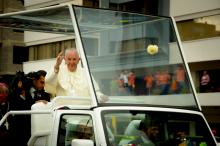
Pope Francis correctly points out that while “we are not yet tearing one another apart … we are tearing apart our common home," and that not defending our common home “is a grave sin."
The scientific community, Pope Francis believes, “realizes what the poor have long told us: Harm, perhaps irreversible harm, is being done to the ecosystem," Through human-made decisions that resulted in pollution and exploitation, Pope Francis declared, "The earth, entire peoples and individual persons are being brutally punished."
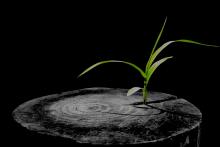
“The task of cleaning up our environment calls for a total mobilization by all of us. It involves governments at every level; it requires the help of every citizen.”
Sounds like a liberal Democrat, right? Someone who has been using Pope Francis’s recent climate encyclical Laudato Si’ (“Blessed Be”) as a political bludgeon, wielded against “climate change deniers?” Nancy Pelosi, perhaps? Not quite.
With these words, President Richard Nixon concluded his plea to congress in 1970 to take action on behalf of the environment, stressing that this was “an urgent common goal of all Americans.” Nixon then gathered bipartisan support as he spearheaded the creation of the Environmental Protection Agency, and inked 14 laws related to environmental protection.
To be sure, Nixon didn’t know what to make of environmentalists, once complaining that they wanted everyone to live like “a bunch of damned animals.” Still, when a 2012 poll asked 12 leading environmental groups to rank the three most environmentally-friendly presidents, Nixon came in second — behind Teddy Roosevelt, a fellow Republican.

The interfaith element of the pope’s environmental message was reflected in the diverse range of religious leaders present.The interfaith element of the pope’s environmental message was reflected in the diverse range of religious leaders present.Religious leaders from across the globe led a “Many Faiths – One Planet” march to the Vatican on June 28, to show their support of Pope Francis’ groundbreaking environmental encyclical.
Organizers estimated a crowd of 5,000 people reached St. Peter’s Square to celebrate the pontiff’s tough stance on climate change, after parading through Rome under a canopy of painted banners.

The past 12 months of violence against unarmed black bodies continues to draw national attention to the ongoing challenge of police brutality in the United States. Under the collective action call of #blacklivesmatter, activists and concerned citizens across the country challenge the ideology of white supremacy undergirding our criminal justice system and demand an end to state violence against black bodies. Yet the #blacklivesmatter movement is about more than an end to police brutality; it is call for the health, wholeness, and vitality of all black communities and a world in which black lives are no longer systemically and intentional targeted for demise. This includes an account of the physical environment in which black communities reside.

Pope Francis writes, “All of us can cooperate as instruments of God for the care of creation, each according to his or her own culture, experience, involvements, and talents.” And it is the combination of our talents that can alter the path of destruction we have traveled down for far too long.
Pope Francis paints the picture of this path all too well.
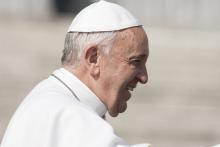
By choosing to focus on the plight of the poor and the groaning of the earth itself, Francis is tapping into something much deeper than denominational squabbles and political maneuvering. He is seeking to make an end-run around the tedious shouting matches of privileged contenders in pitched ideological battles. This is a pope, not of the pundits but of the people – and of the planet.
We’re all connected. Just as the body of Christ is one – despite all of our institutional and ideological boundaries – all of humanity, all life is one. We’re rooted together in the soil that feeds us, in the natural ecosystems that sustain our very existence.

Pope Francis is throwing the full weight of Catholic teaching, and his considerable moral standing, behind the fight against climate change in an unprecedented papal document on the environment that immediately makes the Catholic Church a major player in one of the most important and contentious debates of the next generation.
A draft version of the 192-page encyclical, which will be officially published on June 18, indicated that Francis wastes little time with climate-change deniers or his critics on the right — many of them within the church.

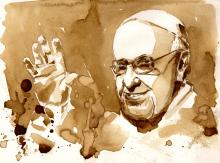
Next week, Pope Francis is scheduled to release “Laudato Sii” (“Praised be You”), his eagerly anticipated encyclical (authoritative teaching document) on the environment.
I have never seen such excitement – and controversy – surrounding an encyclical. It speaks to the extraordinary global presence Francis has achieved in a relatively short period of time. This feels to me like one of those rare moments when the Message and the Messenger can combine to change the world in a very significant way.

Why does caring about Jesus mean we should care for the earth? There are plenty of Old Testament passages about the lordship of God over all creation, but let’s limit ourselves, for the sake of evangelical argument, to Jesus. He cares about ecology because of his incarnation into creation, his miracles restoring creation, and his lordship over creation.

ONE OF THE most destabilizing facts of the last five years is this: The price of a solar panel has fallen 75 percent. The engineers have done their job, and that offers many possibilities.
We usually look at what the developed countries are doing with renewable energy, such as the fact that there were days during summer 2014 when Germany was generating three quarters of its power from solar panels (Germany!). But the most amazing miracles—and it doesn’t really stretch the word “miracle”—are happening in the poorest places, where for the very first time lights are blazing on.
Take rural Bangladesh, where fossil fuel has barely penetrated in the 200 years of its ascendancy in the West. There’s no grid—at night it just goes dark. Until the last few years, when low-cost solar panels and innovative financing arranged by groups such as the Grameen Bank have allowed the very rapid spread of solar panels. How rapid? As many as 80,000 new connections a month, which is far more than in the United States. Fifteen million Bangladeshis live in solar-powered houses already, and the government is hoping to have the entire nation hooked up by 2020.
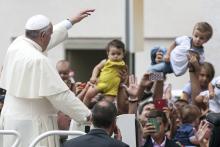
More than 300 rabbis — inspired by the climate crisis, the Torah’s call for a Sabbatical Year of releasing the Earth from overwork, and the impending Papal Encyclical on the climate crisis — have joined their voices in the Rabbinic Letter on the Climate Crisis: a call to action to prevent further climate-fuelled disasters and work toward eco-social justice.
Rabbis from across the denominational spectrum, at this writing 333 in all, signed in support of the call in less than two weeks, and their signatures continue to grow.

LAST SPRING, Archbishop Desmond Tutu, an architect of the South African freedom movement, called for “an apartheid-style boycott to save the planet.” Tutu—along with millions of people of faith and conscience—understands not only that it is morally right to address climate change, but that money talks. “People of conscience need to break their ties with corporations financing the injustice of climate change,” said Tutu.
The fossil-fuel divestment movement has its roots in grassroots mobilizing, churches, local governments, and student campaigns. The movement has grown exponentially in the U.S. since Maine’s Unity College became the first campus to divest (in 2012) and the United Church of Christ became the first denomination to formally divest (in 2013). Today, divestment from fossil fuels is gaining momentum, with increasing numbers of asset owners committing to moving their money.
In fact, this campaign has grown faster than any other previous divestment movements, including those against apartheid in South Africa and tobacco. A number of factors indicate that we are at a tipping point. Here are four: 1) last year was the hottest year on record, 2) expenses related to climate change are skyrocketing, 3) significant financial risks are now associated with fossil-fuel investments and the divestment movement is growing, 4) and the economics of renewable energy products is improving, so investments in these products is growing.
This is an introduction to a five-part series in Sojourners' June 2015 issue about divestment; to read the rest, click here.
IT WASN'T A HUGE surprise last year when Union Seminary announced that it would become the first seminary in the world to divest from fossil fuels. Union, after all, has long been a leader in progressive causes, and President Serene Jones said that “divestment of our endowment from fossil-fuel companies is one small step” toward stopping the catastrophic threat—the “sin”—of climate change.
But a few months later, the divestment movement reached an altogether different level when the Rockefeller Brothers Fund announced that it was moving its money from fossil fuels, starting with the worst carbon polluters, coal and tar sands. The Rockefeller money, of course, came from oil—patriarch John D. Rockefeller was the co-founder of Standard Oil—and the Rockefeller Brothers Fund controls $860 million in assets. All in all, 180 institutions have pledged to divest more than $50 billion to defund climate change—and, as they say, with billions in assets moved, pretty soon you’re talking real money.
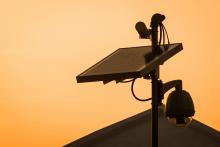
FOR SOMETHING as simple as sunlight, the solar energy industry can be a bit complicated. But that never stopped pastor Brian Flory from trying to see the light.
“Putting solar panels on the roof of our congregation was important to us,” said Flory, who runs the Beacon Heights Church of Brethren in Fort Wayne, Ind. “For us it seemed like a wonderful opportunity to live out the values that our faith was leading us toward.”
To live out one of the core values of his faith—being good stewards of God’s creation—Flory began the process of installing panels on his church’s roof in 2014. He’d barely raised the needed $20,000 to support the project when a bill in the Indiana state legislature nearly stopped him in his tracks.

In a world of highly charged political rhetoric, the essay provides language and a framework for a community discussion on environmental ethics that takes a step back from immediate policy debate. This work doesn’t diminish the importance of these other discussions; rather it provides a context in which that work might be more readily possible.
Our ability to make meaningful collective moral decision requires us to be able to first have enough common moral language to have a conversation. This might be a good place to start.